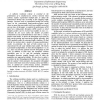Free Online Productivity Tools
i2Speak
i2Symbol
i2OCR
iTex2Img
iWeb2Print
iWeb2Shot
i2Type
iPdf2Split
iPdf2Merge
i2Bopomofo
i2Arabic
i2Style
i2Image
i2PDF
iLatex2Rtf
Sci2ools
102
click to vote
LCN
2006
IEEE
2006
IEEE
Analysis of Exponential Backoff with Multipacket Reception in Wireless Networks
A collision resolution scheme is essential to the performance of a random-access wireless network. Most schemes employ exponential backoff (EB) to adjust the transmission attempt rate according to the changing traffic intensity. Previous work on exponential backoff was mostly based on the conventional single-packet-reception model where no more than one packet can be successfully received at any one time. In this paper, we analyze the performance of EB based on a Muti-packet Reception (MPR) model, in which multiple packets can be received successfully at once (i.e., collisions do not occur unless the number of packets transmitted exceeds a threshold that is more than 1). Using a Markov chain model, we derive the throughput expressions for both carrier-sensing and non-carrier-sensing networks with MPR capability under the saturated-traffic condition. We find that the two systems share a number of common performance results. In particular, the state of both systems can be characterized ...
Related Content
| Added | 12 Jun 2010 |
| Updated | 12 Jun 2010 |
| Type | Conference |
| Year | 2006 |
| Where | LCN |
| Authors | Peng Xuan Zheng, Ying Jun Zhang, Soung Chang Liew |
Comments (0)

